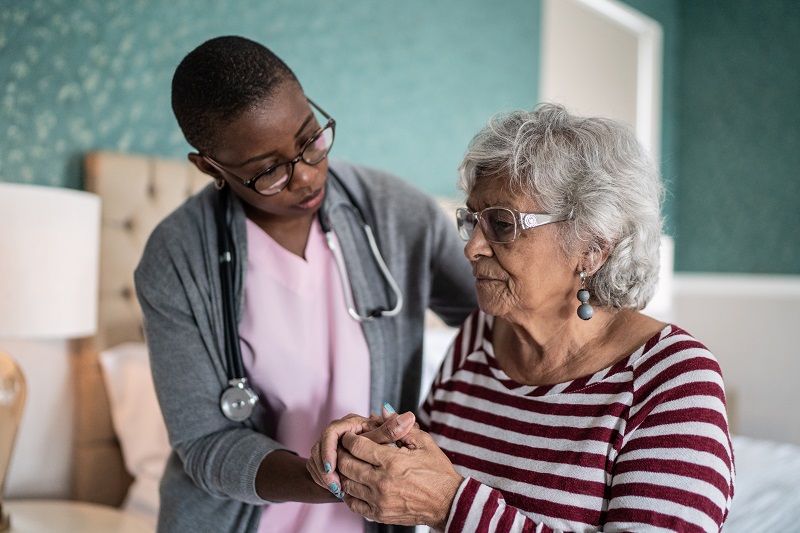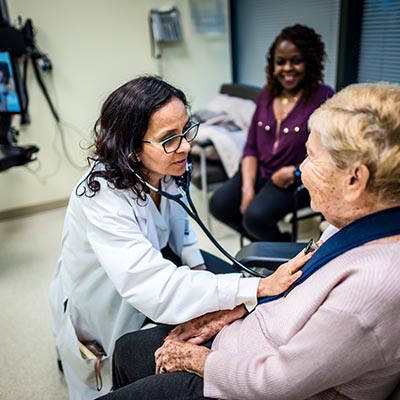

By Katie Lynch
The holidays are a special time of year for the gathering of friends and family, but a diagnosis of dementia can quickly change the dynamic of how, and where, you celebrate. Considering the planning, stress and anxiety that holiday travel can have even for a healthy person, is it possible to travel if you or a loved one has dementia?
It can be a difficult decision to make, explains Manisha Parulekar, M.D, FACP, AGSF, CMD, chief of the Division of Geriatrics at Hackensack University Medical Center. “A dementia diagnosis certainly changes things. Although you may need to adapt your plans, and logistics will need to be thoroughly examined, the most important factor to consider is whether or not it is safe for your loved one to travel,” says Dr. Parulekar.
Sharing a brief background on the illness, Dr. Parulekar provides some insight on how to determine if traveling is right for someone with dementia.
What is dementia?
“Dementia is not a specific disease or illness, it actually represents a group of various brain conditions that deal with memory, reasoning skills and communication,” shares Dr. Parulekar. “Alzheimer’s disease is one of the most common forms of dementia; however there are other types as well, including vascular dementia, frontotemporal dementia and Lewy body dementia.”
There are three basic stages of dementia – early stage, middle stage and late stage, each potentially lasting from months to years. Symptoms of dementia differ depending on which parts of the brain are affected and the stage of the disease. The most common symptoms include memory loss, impaired ability to focus or pay attention, difficulty communicating and even changes in behavior or personality.
“During the early stage, the patient may seem forgetful or confused, however as it progresses, during the middle stage, they may not recognize family or friends and are more prone to wander and get lost in familiar places,” adds Dr. Parulekar. “In the late stage, patients will typically need help with every aspect of daily life, as dementia can cause severe problems with memory, judgment and other skills.”
Considerations for Travel
Will my loved one be safe? “As previously mentioned, the first thing to consider before travel is, ‘Will my loved one be safe?’ This determinant is likely dependent on the stage of dementia your family member is in. If you answered yes, they will be safe, then there are tips and techniques that can help support a positive travel experience for both of you,” advises Dr. Parulekar. “It’s also important to remember, if the patient is resistant or reluctant, don’t try to force it. That is a clear indicator that traveling is not a good idea.”
How do they react to loud, busy or crowded situations? “Chaotic situations can trigger wandering, so you want to make sure you’re not putting the patient in situations that could become emotionally or physically harmful for them,” says Dr. Parulekar. “If they are in the early stages of dementia, this might not be an issue, but it’s a decision that has to be made based on the person’s unique condition.”
How long is the travel time? The less travel time the better, and it’d be particularly smart to avoid connecting flights. “To make them feel comfortable, consider bringing along familiar items,” suggests Dr. Parulekar. “If you’re going to be in a confined space for a few hours (such as a car or plane) family photos or a blanket from home can help them feel more at ease.” It’s also a good idea to let the airline or hotel know of their condition ahead of time, this way they can accommodate any special requests.
Do you have a plan? Preplanning is critical. Be sure to pack the essentials – any necessary medications, a list of food or drug allergies, emergency contact information, physician contacts and insurance information. Stay with your loved one at all times, and if you do happen to get separated, make sure they are wearing an identification bracelet. “As forgetfulness is a hallmark of the disease, it’s also important that the caregiver takes ownership of the patient’s points of identification and travel information,” notes Dr. Parulekar.
Do they have a travel partner that is equipped to care for their needs? “Aside from the patient’s abilities and needs, it’s important to assess the person who will be caring for them. Have you identified their travel partner and are they equipped to provide care and assistance? It is important to closely consider the options and make sure you’re not putting yourself or the patient in a compromising situation,” cautions Dr. Parulekar. “We understand that withdrawing from a beloved tradition can be an emotional decision to make, but there are other means to participate, like connecting with family through a video chat.”
If you’re unsure of your loved one’s travel ability, consult their physician. It may also help to host a trial run, and travel locally beforehand.
To learn more about dementia or to make an appointment with one of our specialists, visit HackensackMeridianHealth.org/Neurology.
For information surrounding the complete wellness, prevention and treatment services for the unique needs of older adults, please visit Hackensack University Medical Center’s Geriatric Division’s web page, HackensackUMC.org/Geriatric-Medicine.
The material provided through Health Hub is intended to be used as general information only and should not replace the advice of your physician. Always consult your physician for individual care.
Find a doctor near me

Do Brain-Training Games Really Boost Brain Power?

Healthy at Home with Parkinson's

How Isolation Can Affect Cognitive Function
